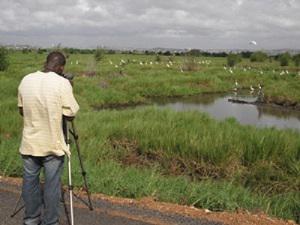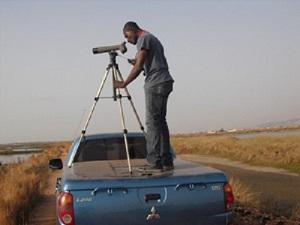Nathaniel Annorbah
This project assesses the diversity and abundance of birds of the Densu Delta Ramsar site, Ghana and its fringe communities to obtain baseline data for future studies and management.

The Densu Delta Ramsar site has been designated as an Important Bird Area (IBA) by BirdLife International. The site and associated wetlands provide opportunities for fishing and commercial salt extraction by local communities as well as feeding and roosting habitats for both local and migratory bird species and endangered marine turtles of global conservation significance. The site also has a great bird-watching and nature tourism potential. It is thus important to assess the ecological health of the site and associated wetlands to provide the basis for the initiation of degradation mitigation programmes. This project will thus study the diversity and abundance of the avifauna of the Ramsar site and adjoining areas as a measure of its ecological health. The data obtained will also serve as a baseline for future studies subsequent to vegetation restoration and conservation activities in the study area.

Together with students and the fringe communities of the Densu Delta Ramsar site, tree planting exercises will be conducted in parts of the Ramsar site and associated wetlands for soil protection and to control water loss through excessive evaporation. Trees will be planted along the banks of the Densu River in some selected communities fringing the wetland.
Furthermore, in conjunction with community leaders, biology students from the University of Ghana and other relevant stakeholders, this work will conduct awareness creation and education of the students and people of the fringe communities in the study area and the general public, on the importance of the Ramsar site and associated wetlands in general. Finally, the work will also solicit the commitment of the fringe communities in the Densu Delta Ramsar site and the general public for the sustainable use of the resources in the catchment area and other wetlands in Ghana.